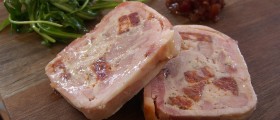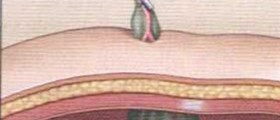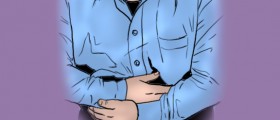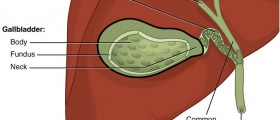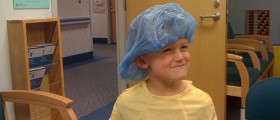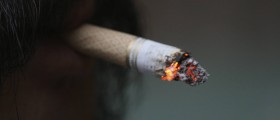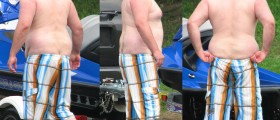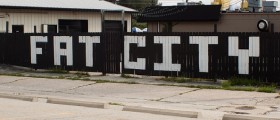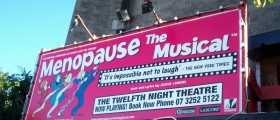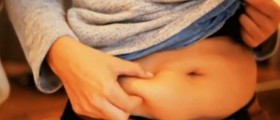Loading...
Guest wrote:
I had my gall bladder out Oct 2005 and slowly, I've managed to gain over 40 lbs. It seems everything I eat goes right through me and I feel nauseous at times. I'm at wits end!! Awhile ago I went on a hard core diet, went to the gym, the whole bit.......I gained a lb doing it.
I had my gb out about a week and ahalf now, I lost weight to fast and bam my gull bladder said "I dont think so" anyways...I am great now and still loosing weight. You aren't gaining weight by going to the gym. The lb you gained was MUSSLE. When I started dieting, (lifestyle change) I hate the word diet, the scale did not change for 1 month. I stayed at 170 and at times it read 175 (now I am 126) (yah it's discouraging but it's the truth) but I also noticed my clothes didn't fit anymore (were a lot looser) after a month the scale came down. You gain mussle when you first start, mussle weighs as much as fat does. I have had no problems since my gb came out, and I am really confussed because I have read that people have had all these problems. (I read it everywhere) I go to Mcdonnalds and I auto know if I eat there, I better know where the bathroom is about 20 min into it. (I know this in advance though) Don't want to have to use the bathroom every 30 min don't eat the fat. Plain and simple. If I want it I know what's ganna happen, then I choose. I've had NO pain since it was taken out, I feel great.. and I guess I should write this here because my mom and sister had theirs out too and they have no problems at all. NONE...So I am really confussed and wonder if there isn't other things going on with those of you that are having problems that aren't related to the surgery. Also if you start out with a liquid diet I wonder about that too, because right after sugery they brought me hospital food (normal diet) and my husband brought me a ham and cheese and muffin. I was starving so I ate both LOL... Maybe its different for those that don't start out "liquid" and just eat as they normally do...
Connie Perry
what's mussle?
Loading...
Loading...
Loading...
Loading...
Loading...
Loading...
Cranistan wrote:
Look, here's how you handle not having a gallbladder.
What does not having a gallbladder mean? It essentially means:-
a) that your body is now unable to emulsify fats as well as it did previous to your surgery.
b) that you will have a steady trickle of bile which is roughly 8 times weaker than other peoples' running through your small intestine.
c) that the pH of your digestive tract will become more acidic (bile is an alkaline substance), altering the balance of your intestinal flora.
This is why after having their gallbladder removed, people suffer from diverticulitis, IBS, indigestion, reflux, nausea, ulcerative colitis and various other unpleasant illnesses. Together, the milder of these symptoms are known as post-cholecystectomy syndrome. Sadly, the current medical paradigm does not acknowledge the long-term negative effects of this surgery.
But, if you change one or two things in your lifestyle/diet, living without a gallbladder can be peachy:-
a) Start supplementing fish oil (as a poster above suggested) - you'll need to supplement a lot; 2g in the morning and 2g in the evening. If you have a heart problem, don't do this; at high doses fish oil has been known to f**k with the electrical impulses governing the heart muscle - talk to your doctor. Eating fish will not cut the cheese because you really need this fat now that it's even less bioavailable, and chances are you aren't going to want to eat fish every day.
b) 5 or more small meals per day. Don't binge, because you'll get sick, fat, or both. Also, leaving too long between your meals means that the bile which in now always (and I stress this), always running through your digestive tract, has time to irritate the walls of your intestines, meaning that when you do eat you'll have violent cramps and most likely diarrhea (in time your body will adjust). Healthy snacking will also help keep you from feeling like you need to binge eat at lunch or dinner time.
c) Don't sleep for too long. Many people have issues with retarded peristalsis after gallbladder removal, which means the food just sits there and doesn't move. This is bad for you. Max 8 hours, and try to be as active as possible.
d) Stop eating filth. Don't eat a salad covered in dressing and kid yourself it's healthy. Your small intestine needs to be treated very gently now; use your brain. You may find yourself unable to eat certain things now, it's different for everyone. No more fast food. Even if you're thin, it doesn't mean the fat is not building up inside you and poisoning/constricting your organs.
e) Probiotics. Not for everyone, but with the new digestive ratio that has been created in your guts you may find that these supplements offer relief from certain symptoms. If you're having problems with gas, diarrhea or bloating now, a regimen of probiotics may help. No, not yoghurt; many brands are little more than just sugar and milk. You may find that these bacteria will also help you break down certain foods that you are no longer capable of digesting effectively.
f) Fiber is important. It's even more important now. It won't prevent bowel cancer, that's a myth, but it will help your body to move food through your intestines and allow more efficient digestion of the nutrients you're (hopefully) getting from elsewhere in your diet. Don't eat too much - try to make sure you eat soluble fiber rather than wheat bran etc.
What I've written here is not for everyone, but I feel it's a rough guide for how to deal with what many people will be going through. I'm sick of reading about people having problems after gallbladder removal and seeming so lost, and worse, extremely sick. Good luck.
I wish I saw this post after I had my gallbladder removed. After six years of not knowing what to do about extra pounds and bowel movements, I now have NAFLD. My doctor said it had some kind of connection to my gallbladder removal. Now I see what the connection was. :(
I absolutely agree. I had my gallbladder removed in Dec 2011. I followed a very strict diet for the 1st month, basically doing babykost (this means no spices, no pork, no red meat, no coffiee, no chocolate). Then after that month I went on to a mild diet, this is a bit heavier diet, this means I am gradually introducing the above mentioned foods to my body. And it works. The one thing I did 2 weeks after my operation is that I went to an ostheopath (saved my life because due to anastetics my body went into a shock after the operation). He repaired the tissue wangles in my body. This allowed for the anastetic to pass through my body, also other fluids. I had immense headache and nauseau after the op. But I am really doing very well because I am following the healthy diet. I also try my utmost best not to use any pain tablets for headaches eg. This also works. And I started to do excercise.
Loading...
Loading...
Since your body has trouble breaking down the fats eaten after a gallbladder removal, I recommend digestive enzymes. Be sure to get good quality enzymes that break down fats. This should help:-D
Loading...
Loading...
I have to say, all of yalls comments had me terrified to get my gallbladder taken out. But I had it taken out this morning & have had no problems yet other than being really sore of course. My shoulder is very sore but I read it is because they had to blow up my abdominal cavity with air to see what they were doing & it should subside within a few days. I am terrified of gaining weight & am hoping that instead of making me gain weight, it will make me lose, But to all the people doing research before your gallbladder removal, most of these people saying they gained weight were probably not eatng right in the first place. Just take careof yourself & listen to your body & you will be just fine. The surgery will be over with before you even know it.
Stacey, 21, North Carolina-USA
